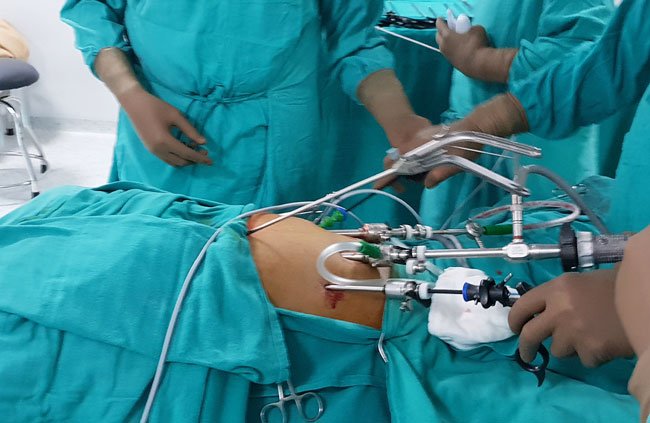Gallbladder Surgery
What Is Gallbladder Surgery?
Gallbladder surgery is done to remove the gallbladder. The gallbladder is a small pouch present below the liver. The bile, which is secreted from the liver, is stored in the gallbladder. There are two types of surgery done to remove the gallbladder. These surgeries are Open Cholecystectomy and Laparoscopic Cholecystectomy.

What Are The Conditions Requiring Gallbladder Surgery?
Gallbladder surgery is required in the following conditions:
Gallstones: When the gall stone blocks the bile duct, it causes pain which subsides as the stone gets removed. The condition usually occurs after the meal when the gallbladder empties itself in the intestine. In most patients, the condition is recording and requiring removal of the gallbladder.
Gallbladder cancer: Cancer in the gallbladder leads to its removal. Open cholecystectomy is usually preferred in case of cancer.
Cholangitis and gallstone pancreatitis: In rare condition, gall stone may lead to Cholangitis and gallstone pancreatitis.
What Are The Symptoms Of Gallbladder Stone?
Patient with gallstone may experience symptoms such as nausea vomiting, back pain, pain in the right shoulder, and intensifying pain in the center or at the right side of the abdomen. Factors that increase the risk of gallstone are being a female, obesity, sedentary lifestyle, high cholesterol, pregnancy, and low fiber diet.
What Are The Treatment Options Of Gallbladder Stone?
Cholecystectomy: The doctor may recommend removal of the gallbladder. After removal, the bile from the liver directly drained into the intestine. This surgery usually done with laparoscopic method with minimal risk.
What Is Gallbladder Cancer?
Gallbladder cancer is characterized by the presence of malignant cells in the gallbladder. The condition is rare and if identified at the initial stage can be treated effectively. Unfortunately, most cases are diagnosed at a later stage and thus require aggressive treatment and have a poor prognosis.
How Gallbladder Cancer Is Treated?
Following are the treatment options for gallbladder cancer:
- Chemotherapy
- Radiation therapy
- Removal of gallbladder
- Removal of the gallbladder and a par of liver called as radical cholecystectomy



